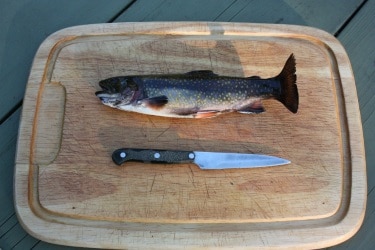I’ve been with friends who make no qualms about just cleaning the fish right there in the stream or lake. But I’ve often wondered what is the proper etiquette for cleaning them. Should I bury the entrails or just throw them in the water? And, is that even legal to do or will someone get upset?
So, is it illegal to throw fish guts in the water? Though legal in some areas, it’s discouraged or illegal in many states in the U.S. to discard fish entrails back in the water. The most recommended way to dispose of fish guts would be to pack them out and dispose of them in the trash with your regular household waste.

Keep in mind that in small quantities, this fish waste is usually eaten by scavenging fish and other aquatic wildlife and generally is not a problem. In large amounts – especially where water circulation is restricted like small ponds and lakes – the decomposition of fish waste can deplete the water of oxygen which can lead to reduced water quality and dying fish.
If you choose to take the entrails with you so you can get rid of them at home, there’s a couple of things you can do to help keep the smell of rotting fish in your house and neighborhood at bay.
Keep your trash can from smelling like rotten fish until garbage day
So you’ve decided to clean your fish, put the remains in a plastic bag, and take them home to dispose of in the trash but now have the issue of stinking up the trash can and vicinity as well as attracting flies, raccoons, and every stray cat in the neighborhood.
A very simple solution is to put the entrails in a zip-lock bag (some people recommend adding water) and just toss that in the freezer until garbage day!
What to do with fish guts when you’re camping?
What if you’re out camping and it’s going to be a while before you get home. You don’t necessarily want to be packing around fish remains with you for days leaving a scented trail for predators to follow right to your tent!
It’s generally agreed upon that, unless the regulations for the specific area you are in say you shouldn’t, this would be one of those times where it might be best to leave the remains in the water where the fish came from.
One recommendation is to puncture the air sack/bladder and dispose of them in deep or rushing water. If discarding in deep water, you can weigh the remains with a small rock if possible to help them sink. Also, dump them at the same source as where you caught them – discarding the remains in a different water source can spread disease.
Another option would be to bury them. If you choose to do so, bury the remains downwind a safe distance from your camp and any trails. You don’t want to be attracting any predators towards anywhere people are most likely to be hanging out.
Tips for cleaning your fish at camp
- Do all of your prep and cleaning away from your campsite
- Keep the area as clean as possible
- Don’t just toss the remains on the banks – always try to dispose of them in deep water
- Wash your hands and utensils really well in order to get the smell off
- Remember not to wipe your hands on your clothes after cleaning or handling the fish or bait
- Eat your catch as soon as possible so you’re not storing it any longer than necessary
Basic fish cleaning etiquette
- As a rule, it’s best to be prepared to wait and clean the fish at the location where you’re going to eat it. This usually means at home.
- Take a minute to look for, read, and follow any specific regulations or sign postings specific to the area you’re in and/or at cleaning stations if your site has one.
- Don’t dump the fish remains in public bathroom toilets or trash cans.
- Remember to be considerate of swimmers, boaters, and other nature lovers who are likely to be enjoying the area. Don’t gross out or endanger others by leaving sharp bones and predator bait lying around in the shallows or on the banks where people and their pets can possibly get hurt or sick. Don’t give fishermen/women a bad rap!
How to clean a fish
Things you’ll need
- stable cutting surface
- sharp flexible knife
- water and ice
- zip lock bags or storage container with lid for remains
Here’s a video demonstration of cleaning a fish courtesy of Idaho Fish and Game:
How to store your fish to keep it fresh until you’re ready to eat it
If you choose not to use a stringer (keep the fish alive until the end of your trip), for the best flavored meat you’ll want to take steps to keep your fish cool (not frozen) right after catching by putting it in an ice chest.
Be sure to clean your fish the day you catch it – don’t store it without cleaning it first.
Fish are best when eaten within a
If you’re not done fishing, bleed your catch and keep it on a stringer – don’t clean it until just before eating or freezing.
If you decide to freeze the fish for longer storage, you can help avoid freezer burn by first covering the cleaned fish inside the storage bag with water.
Other ways to use or dispose of fish entrails
- many people make use of fish guts as an organic fertilizer by burying them in their gardens or adding them to their compost piles
- boil the leftover carcasses and bones for a homemade fish stock (you can freeze the carcasses for a couple of months until you have enough – the more the better)
- many who live in or near wooded areas recommend dumping them in the woods claiming the wildlife quickly takes care of cleaning it up – though a natural process, make sure if you do this that it’s far away from roads and trails and ok with the laws of the land
- some people recommend simply flushing the entrails (not the bones) down the toilet
- feed them to your chickens – you have chickens, right?
- most garbage disposals can handle a few small bones, such as small chicken and fish bones but it’s probably best to throw all bones in the trash – toss some lemon or orange peels in afterwords with a couple of ice cubes to get rid of the smell in your sink
- What about using fish guts as bait? Fish entrails can be used as an effective, inexpensive bait for catching other fish, crabs, crawdads, and other seafood. The legality may be very specific to the body of water you are fishing in. Both for whether you can legally use fish guts for bait and specifically what type of fish remains you can use. So make sure you are familiar with the regulations surrounding your specific fishery!
Is it ok / legal to clean fish while on a boat?
A general guideline to follow, for any fish that has a size or weight limit that could be inspected by a Fish and Game warden, would be to keep the fish intact/whole if you’re going to bring the fish to shore, i.e. take it home or cook it back at the campsite.
For other fish, it’s best to resort to the rules and guidelines for the specific body of water you are fishing in, as each location may have different requirements pertaining to cleaning fish on board a vessel.
Would it be ok / legal to clean the fish while I’m still fishing?
In all honesty, unless it states specific in the regulations pertaining to your body of water, this one seems to be up to the mood and interpretation of the warden.
To prevent any headaches or issues, it’s probably best to keep the whole fish intact or at the very most just remove the entrails leaving the skin, head, and tail for proper identification of species, size, and weight.
Practicing proper fish-cleaning methods and etiquette, and properly disposing of fish wastes will help keep our waterways, nature trails, and campgrounds pristine – and maintain our reputations as good neighbors for each other and our fellow outdoorsmen.
